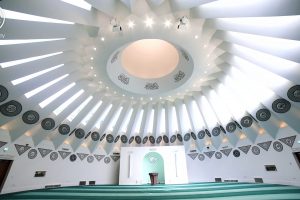
In the Mubarak Mosque in Islamabad, Tilford, His Holiness Hazrat Mirza Masroor Ahmad (aba) envisioned having the attributes of Allah on its walls so people could reflect deeper on God’s existence. His Holiness (aba) guided minutely on all aspects of design and implementation.
This series delves deeper into each of God’s attributes to gain a better understanding of His Being.
The calligraphy was designed by Razwan Baig, while The Review of Religions were given the opportunity to manage the project and produce each piece. Research for this series was compiled by Syed Mubashar Ayyaz (Research Cell) and translated into English by Shahzad Ahmed, Zafir Mahmood Malik and Nooruddeen Jahangeer Khan.

80. THE SELF-SUFFICIENT (AL-GHANIYY)
وَٱعۡلَمُوٓاْ أَنَّ ٱللَّهَ غَنِيٌّ حَمِيدٌ
‘And know that Allah is Self-Sufficient, Praiseworthy.’[1]
The attribute الْغَنِیُّ (Al-Ghaniyy) is derived from the Arabic root غَنِیَ (gha-ni-ya). According to the Arabic lexicon ‘Aqrab al-Mawarid, غَنِیَ فُلَانٌ (ghaniya fulānun) means that one became rich and affluent. Another related meaning is أَغْنٰی عَنْهُ کَذَا (aghnā ‘anhu kadhā) which means that he granted salvation to another.
On one occasion, the companions (ra) expressed their concern to the Holy Prophet (sa) due to a lack of rain. The Holy Prophet (sa) gathered the people and addressed them, saying that in order to alleviate the drought, God Almighty had commanded them to pray for it and had stated that He would surely accept their prayers. The Holy Prophet (sa) then raised his hands and offered the following prayer:
‘All Praise is due to Allah, the Lord of all the worlds, the Gracious, the Merciful, the Master of the Day of Judgement; none is worthy of worship except Allah, Who does what He wills. O Lord! You are Allah, nothing is worthy of worship except You; You are the Self-Sufficient, and we are in need; send down rain upon us and make it what you send down as a source of strength and satisfaction for a time.’[2]
Allah Alone is Worthy of Worship
Whilst explaining this attribute, the Promised Messiah (as) states:
‘So, what is there, besides God, that can be found to possess the qualities of independence and self-sufficiency, so that someone might take it as worthy of worship? Since there is nothing independent and self-sufficient other than God, this is enough to prove the falsity of all creature-worshippers.’[3]
ENDNOTES
[1] The Holy Qur’an, 2:268.
[2] Sunan Abi Dawud, Kitab Salat al-Istisqa’, Hadith No. 1173.
[3] Hazrat Mirza Ghulam Ahmad (as), Barahin-e-Ahmadiyya – Part IV (Farnham, Surrey: Islam International Publications Ltd., 2016), 331.

81. THE OPENER OF DOORS [TO SUCCESS]; THE JUDGE (AL-FATTĀḤ)
قُلۡ يَجۡمَعُ بَيۡنَنَا رَبُّنَا ثُمَّ يَفۡتَحُ بَيۡنَنَا بِٱلۡحَقِّ وَهُوَ ٱلۡفَتَّاحُ ٱلۡعَلِيمُ
‘Say, “Our Lord will bring us all together; then He will judge between us with truth: and He is the Judge, the All-Knowing.”’[1]
The attribute الْفَتَّاح (Al-Fattāḥ) is derived from the Arabic root of فَتَحَ (fa-ta-ḥa) and has a number of different meanings. One meaning of فَتَحَ is to adjudicate between people. فَتَحَ السُّلْطَانُ (fataḥa al-Sulṭān) means the Sultan gained victory. فَتَحَ اللهُ عَلٰی فُلَانٍ (fataḥa Allāh ‘alā fulān) means that Allah the Almighty bestowed knowledge and wisdom upon a person.[2]
With regards to the attribute Al-Fattāḥ, Sharf al-Din al-Tibi writes in his commentary, Mishkat Al-Masabih: ‘Al-Fattāḥ means the One Who opens the door for His mercy, the One Who opens the hearts of the believers to recognise His cognisance, the One Who opens the doors of His mercy for those who have sinned and the One Who discloses His hidden secrets so that people may believe in His existence.’[3]
It is narrated in a tradition that on the day of the Battle of Badr, ‘the Messenger (sa) of Allah went forth with 313 men. The Messenger (sa) of Allah said: “O Allah, they are on foot, provide mounts for them; O Allah, they are naked, clothe them; O Allah, they are hungry, provide food for them.” Allah then granted them victory on the day of Badr. When they returned home every single person had one or two camels; they were clothed and ate to their fill.’[4]
Allah Responds to the Call of a Supplicant
With regards to the bounties Allah the Almighty bestows upon His chosen servants, the Promised Messiah (as) states:
‘Allah will help you at a difficult time. The commandment of Allah, the Gracious, for His vicegerent, for whom is the heavenly kingdom: he will be bestowed a vast kingdom; treasures will be opened for him. This is Allah’s grace and is strange in your eyes.
Say, “O ye who disbelieve! I am of the truthful ones. So wait a while for My signs.” We shall soon show them Our Signs around them and in their own selves. On that day the arguments will be carried to its conclusion and there will be a clear victory. Allah will decide between you on that day. Allah does not guide the one who exceeds the limits and is a great liar.’[5]
ENDNOTES
[1] The Holy Qur’an, 34:27.
[2] Al-Nahj al-Asma, Vol. 1, p. 206.
[3] Sharh Tayyibi, Kitab ad-Da‘wat, Bab Asma’ Allah Ta‘ala, Vol. 5. p.28.
[4] Sunan Abi Dawud, Kitab al-Jihad, Hadith No. 2747.
[5] Hazrat Mirza Ghulam Ahmad (as) The Philosophy of Divine Revelation (Farnham, Surrey: Islam International Publications Ltd., 2018), 113-114.

82. THE JUST (AL-‘ADL)
إِنَّ ٱللَّهَ يَأۡمُرُ بِٱلۡعَدۡلِ وَٱلۡإِحۡسَٰنِ وَإِيتَآيِٕ ذِي ٱلۡقُرۡبَىٰ وَيَنۡهَىٰ عَنِ ٱلۡفَحۡشَآءِ وَٱلۡمُنكَرِ وَٱلۡبَغۡيِۚ يَعِظُكُمۡ لَعَلَّكُمۡ تَذَكَّرُونَ
‘Verily, Allah enjoins justice, and the doing of good to others; and giving like kindred; and forbids indecency, and manifest evil, and wrongful transgression. He admonishes you that you may take heed.’[1]
The attribute of الْعَدْل (Al-‘Adl) is derived from the Arabic root عَدَلَ (‘a-da-la). According to the Arabic lexicon ‘Aqrab al-Mawarid, الْعَدْل (al-‘Adl) means justice and is the antonym of الْجَوْر (al-Jaur), or injustice. عَدَلَ فُلاناً بِفُلانٍ (‘adala fulānan bi fulān) means that one upheld justice between two people.
Al-‘Adl has other connotations such as reward or compensation. One meaning is to sacrifice something in exchange for something else. It also means a gift or a supplementary deed which is involuntary and not obligatory.
Hazrat ‘Abdullah (ra) narrates: ‘On the day of Hunain, the Messenger (sa) of Allah distributed the spoils of war and granted more to some over others. He granted Iqra‘ bin Habis one hundred camels, and gave a similar amount to ‘Uyainah. He also gave some to the chiefs of Arabia and on that day distributed the spoils in a manner whereby some received more of a share than others. Upon this a person said, “By Allah, this distribution (of spoils) is such that it is not just, nor is it in accordance with the pleasure of Allah.” The narrator (i.e. Hazrat Abdullah (ra)) said, “By Allah, I will certainly inform the Messenger (sa) of Allah about this. I went to the Holy Prophet (sa) and informed him about what he had said. The colour of his face changed and it became red. Then he said, “If Allah and His Messenger (sa) do not uphold justice, then who else will?” He further said, “May Allah have mercy upon Moses (as); he was tormented more than this, but he showed patience.”’[2]
Allah Will Dispense Justice
Whilst explaining the qualities of God Almighty being the Most Just, the Promised Messiah (as) states:
‘In short, ill-thinking destroys a man. This is to such an extent that when the hell-bound are cast into hell, Allah the Exalted will say that your sin was that you thought ill of Allah Almighty. There are certain people who believe that Allah the Exalted will forgive the wrongdoers but punish the righteous. This is also to think ill of God Almighty because it contradicts His attribute of justice and implies that virtue and its outcomes – as appointed by God in the Holy Quran – have been wasted, as though they were futile. Bear in mind, therefore, that the ultimate end of ill-thinking is hell, so do not consider this to be a minor illness. For ill-thinking results in despair, despair results in transgression, and transgression results in hell. It is a thing that cuts at the root of truth and sincerity (sidq). Therefore, abstain from this vice and offer supplications to attain the excellences of one who is Truthful (Siddiq).’[3]
ENDNOTES
[1] The Holy Qur’an, 16:91.
[2] Sahib Muslim, Kitab al-Zakat, Hadith No. 2444.
[3] Hazrat Mirza Ghulam Ahmad (as), Malfuzat – Vol. 2 (Farnham, UK: Islam International Publications Ltd. 2019), 86-87.

83. THE GATHERER; THE ASSEMBLER (AL-JĀMI‘)
رَبَّنَآ إِنَّكَ جَامِعُ ٱلنَّاسِ لِيَوۡمٍ لَّا رَيۡبَ فِيهِۚ إِنَّ ٱللَّهَ لَا يُخۡلِفُ ٱلۡمِيعَادَ
‘Our Lord, Thou wilt certainly assemble mankind together on the Day about which there is no doubt; surely, Allah breaks not His promise.’[1]
The attribute of الْجَامِعُ (Al-Jāmi‘) is derived from the Arabic root of جَمَعَ (ja-ma-‘a) which means to collect or gather something.[2] According to the Arabic lexicon Al-Munjid, Al-Kalām al-Jāmi‘ means a statement which uses few words but has a profound meaning. Ibn al-Athir states that the meaning of the attribute Al-Jāmi‘ is the Being Who will gather all of creation on the Day of Judgement.[3]
Ja‘far bin Muhammad narrates that the Holy Prophet (sa) once said: ‘Whoever recites the following verse upon losing something, Allah the Almighty shall return it to them: “Our Lord, Thou wilt certainly assemble mankind together on the Day about which there is no doubt; surely, Allah breaks not His promise. O Allah, most certainly you will gather people on the day about which there is no doubt, return my lost possession to me. Surely You have power over all things.”’[4]
Allah – The Perfect Being with Perfect Attributes
In relation to the attribute of Al-Jāmi‘, the Promised Messiah (as) writes:
‘O Allah Who is the Possessor collectively of all noble attributes and is free from every defect, it is You alone Whom we worship. The God that Muslims know of is One who possesses all the excellences that may be fathomed by the human mind; in fact, He is even higher and far greater than what man can conceive. For the truth is that the human mind, human thought and human intelligence can never, and in no way encompass, the attributes of God Almighty. And so the Muslim believes in a Supreme God, Who is perfect and complete in His attributes. The followers of all other faiths feel embarrassed – and they must feel this way – when expounding their concept of God in public before others.’[5]
ENDNOTES
[1] The Holy Qur’an, 3:10.
[2] Al-Mu‘jam al-Wasit.
[3] Lisan al-‘Arab.
[4] Durr al-Manthur, Tafsir of verse 10 of Surah Aal-e-‘Imran.
[5] Hazrat Mirza Ghulam Ahmad (as), Malfuzat – Volume I (Farnham, Surrey: Islam International Publications Ltd., 2018), 208.

84. THE PROVIDER OF THE MEANS OF SUFFICIENCY; THE ENRICHER (AL-MUGHNĪ)
وَإِنۡ خِفۡتُمۡ عَيۡلَةً فَسَوۡفَ يُغۡنِيكُمُ ٱللَّهُ مِن فَضۡلِهِۦٓ إِن شَآءَۚ إِنَّ ٱللَّهَ عَلِيمٌ حَكِيمُ
‘And if you fear poverty, Allah will enrich you out of His bounty, if He pleases. Surely, Allah is All-Knowing, Wise.’[1]
The attribute الْمُغْنِى (Al-Mughnī) is derived from the Arabic root غَنِیَ (gha-ni-ya). Al-Mughnī is one of the attributes of Allah the Almighty and according to the Arab lexicon ‘Aqrab al-Mawarid, أَغْنَاهُ اللهُ غِنَاءً (aghnāhu Allah ghinā’an) means Allah made him self-sufficient.
The Holy Prophet (sa) taught a prayer which mentions the attribute of Al-Mughnī, especially for those engrossed in debt. He stated:
‘O Allah, suffice me with what You have permitted so that I have no need of what You have forbidden, and by Your grace, make me independent of all those besides You.’[2]
The Provider of Provisions
Explaining how Allah the Almighty grants provisions to His righteous servants, the Promised Messiah (as) states:
‘From among the hallmarks of the righteous, one sign manifested by Allah the Exalted in favour of a pious one is that He frees them from the unpleasant things of this world and Himself becomes the Guardian of their affairs. Allah the Exalted states: “And he who fears Allah – He will make for him a way out and will provide for him from where he expects not.”
Allah the Exalted delivers a person who fears Him from any affliction that may befall him and grants him provision from where he expects not. In other words, one sign of a righteous person is that Allah the Exalted does not enslave him to the recourse of immoral ways and means.’[3]
ENDNOTES
[1] The Holy Qur’an, 9:28.
[2] Sunan al-Tirmidhi, Kitab al-Da‘wat ‘an Rasul-Allah (sa), Hadith No. 3563.
[3] Hazrat Mirza Ghulam Ahmad (as), Malfuzat, Vol. 1 (Farnham, Surrey: Islam International Publications Ltd., 2018), 10-11.




Add Comment